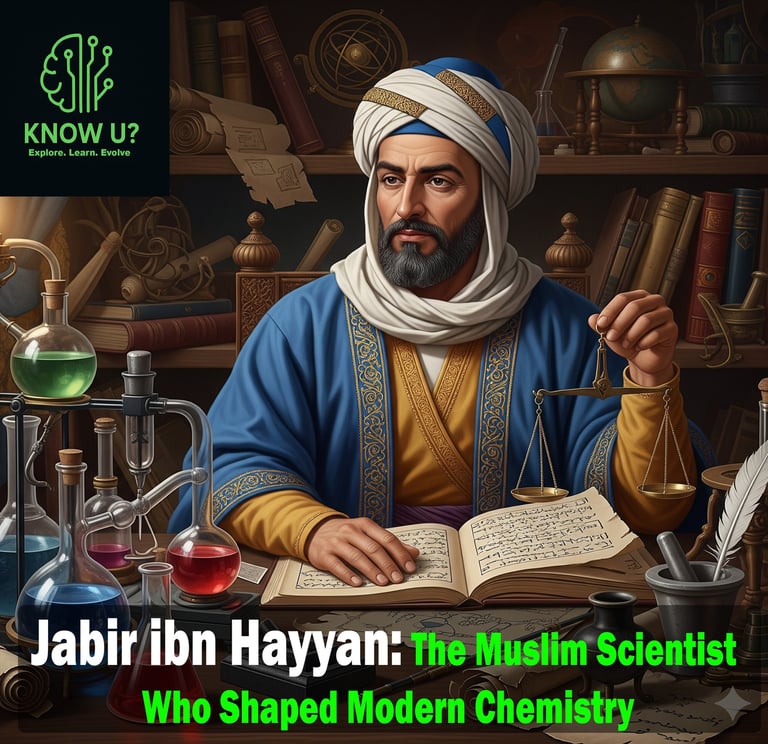Jabir ibn Hayyan: The Muslim Scientist Who Shaped Modern Chemistry
When we talk about the roots of modern science, especially chemistry, one name stands out in history: Jabir ibn Hayyan (721–815 CE). Known in the West as Geber, this Muslim scholar was not just a chemist—he was a polymath, philosopher, and visionary whose ideas transformed scientific thinking for centuries.
9/15/20252 min read


Jabir ibn Hayyan: The Muslim Scientist Who Shaped Modern Chemistry
When we talk about the roots of modern science, especially chemistry, one name stands out in history: Jabir ibn Hayyan (721–815 CE). Known in the West as Geber, this Muslim scholar was not just a chemist—he was a polymath, philosopher, and visionary whose ideas transformed scientific thinking for centuries.
Who was Jabir ibn Hayyan?
Jabir ibn Hayyan was born in Tus, Persia, during the 8th century. He lived during the Islamic Golden Age, a period when Muslim scholars preserved, expanded, and revolutionized knowledge from ancient civilizations. He studied under Imam Jafar al-Sadiq (a prominent Islamic scholar), from whom he learned philosophy, logic, and alchemy.
Contributions to Science
Jabir is often called the “Father of Chemistry”—and for good reason. His contributions were groundbreaking:
Invention of Distillation & Crystallization: He developed laboratory techniques that are still used in modern chemistry, including distillation, crystallization, and filtration.
Discovery of Acids: Jabir identified and prepared strong acids such as nitric acid, sulfuric acid, and hydrochloric acid, which laid the foundation for industrial chemistry.
Alchemy & Transformation: Although he studied alchemy, Jabir pushed the field toward systematic experimentation, helping it evolve into real science.
Jabirian Corpus: His works, collectively known as the “Jabirian Corpus,” comprise hundreds of scientific writings that have influenced both the Islamic world and medieval Europe.
Why Jabir ibn Hayyan Matters Today
Jabir’s legacy is more than ancient history—it’s the backbone of modern chemistry, pharmacology, and materials science. His insistence on careful experimentation and observation was a shift away from mystical thinking and toward evidence-based science.
He also emphasized ethics in science, reminding future generations that knowledge should serve humanity.
Inspiring Future Generations
For Muslims and non-Muslims alike, Jabir ibn Hayyan’s story is a reminder that innovation and faith can coexist. His work bridged cultures, shaped scientific progress, and continues to inspire students and scientists around the world.
Books and Writings
Jabir is said to have authored nearly 3,000 works, though not all survive today.
Famous works include:
Kitab al-Rahmah (The Book of Mercy)
Kitab al-Mizan (The Book of Balance)
Kitab al-Zi’baq (The Book of Mercury)
Kitab al-Hajar (The Book of Stones)
Many of his writings were translated into Latin during the Middle Ages, where he was known as Geber, influencing European science.
Other Fields
Made contributions in medicine, pharmacy, astronomy, mathematics, and philosophy.
Used chemical methods in preparing medicines.
Proposed that all metals are composed of the same basic elements but in different proportions, which was a precursor to later theories in chemistry.
Personality and Legacy
Jabir was not just a scientist but also a philosopher and thinker.
His works influenced European scholars during the Renaissance.
The scientific method of experimentation he applied became the foundation for modern chemistry.
Death
He spent most of his life in Kufa, Iraq.
Passed away around 815 CE.
Titles and Recognition
“Father of Chemistry”
Known in the West as Geber.
A shining star of Islamic science whose legacy shaped the progress of chemistry for centuries.
Jabir ibn Hayyan was the Muslim scholar who laid the foundations of modern chemistry. His experiments, discoveries, and writings made him one of the greatest scientific minds in history, and his influence extended far beyond the Islamic world into medieval Europe.
جابر بن حیان: وہ مسلمان سائنسدان جس نے جدید کیمسٹری کی تشکیل کی۔
جب ہم جدید سائنس، خاص طور پر کیمسٹری کی جڑوں کے بارے میں بات کرتے ہیں، تو تاریخ میں ایک نام نمایاں ہوتا ہے: جابر ابن حیان (721-815 عیسوی)۔ مغرب میں گیبر کے نام سے جانا جانے والا یہ مسلمان عالم صرف ایک کیمیا دان ہی نہیں تھا بلکہ وہ ایک پولی میتھ، فلسفی اور بصیرت والا تھا جس کے نظریات نے صدیوں تک سائنسی سوچ کو بدل دیا۔
جابر بن حیان کون تھے؟
جابر بن حیان آٹھویں صدی میں طوس فارس میں پیدا ہوئے۔ وہ اسلامی سنہری دور میں رہتے تھے، ایک ایسا دور جب مسلمان علماء نے قدیم تہذیبوں سے علم کو محفوظ کیا، پھیلایا اور انقلاب برپا کیا۔ وہ امام جعفر صادقؑ کے شاگرد بھی تھے اور انہی سے فلسفہ، منطق اور کیمیا کے اصول سیکھے۔
سائنس میں شراکت
جابر کو اکثر "کیمسٹری کا باپ" کہا جاتا ہے - اور اچھی وجہ سے۔ اس کی شراکتیں اہم تھیں:
کشید اور کرسٹلائزیشن کی ایجاد: اس نے لیبارٹری تکنیک تیار کی جو آج بھی جدید کیمسٹری میں استعمال ہوتی ہیں، بشمول کشید، کرسٹلائزیشن اور فلٹریشن۔
تیزاب کی دریافت: جابر نے نائٹرک ایسڈ، سلفیورک ایسڈ، اور ہائیڈروکلورک ایسڈ جیسے مضبوط تیزابوں کی نشاندہی کی اور تیار کیا، جس نے صنعتی کیمسٹری کی بنیاد رکھی۔
کیمیا اور تبدیلی: اگرچہ اس نے کیمیا کا مطالعہ کیا، جابر نے میدان کو منظم تجربات کی طرف دھکیل دیا، جس سے اسے حقیقی سائنس میں تبدیل کرنے میں مدد ملی۔
جابرین کارپس: ان کی تخلیقات، جسے "جبیرین کارپس" کہا جاتا ہے، سینکڑوں سائنسی تحریروں پر مشتمل ہے جنہوں نے اسلامی دنیا اور قرون وسطیٰ کے یورپ دونوں کو متاثر کیا۔
جابر بن حیان آج کیوں اہم ہیں؟
جابر کی میراث قدیم تاریخ سے زیادہ ہے — یہ جدید کیمسٹری، فارماکولوجی، اور میٹریل سائنس کی ریڑھ کی ہڈی ہے۔ محتاط تجربہ اور مشاہدے پر ان کا اصرار صوفیانہ سوچ سے ہٹ کر ثبوت پر مبنی سائنس کی طرف تھا۔
انہوں نے سائنس میں اخلاقیات پر بھی زور دیا، آنے والی نسلوں کو یاد دلاتے ہوئے کہ علم کو انسانیت کی خدمت کرنی چاہیے۔
مستقبل کی نسلوں کو متاثر کرتی ہے۔
مسلمانوں اور غیر مسلموں کے لیے جابر بن حیان کی کہانی ایک یاد دہانی ہے کہ جدت اور ایمان ایک ساتھ رہ سکتے ہیں۔ اس کے کام نے ثقافتوں کو جوڑ دیا، سائنسی ترقی کی شکل دی، اور دنیا بھر کے طلباء اور سائنسدانوں کی حوصلہ افزائی جاری رکھی۔
علمی خدمات
کتابیں اور تصانیف
ان کی طرف منسوب کتابوں کی تعداد تقریباً 3,000 بتائی جاتی ہے۔
مشہور کتابیں:
"کتاب الرحمة"
"کتاب المیزان"
"کتاب الزئبق"
"کتاب الحجر"
ان کی تحریریں بعد میں لاطینی میں ترجمہ ہوئیں اور یورپ میں کیمیا و کیمسٹری کی بنیاد رکھیں۔
دیگر علوم
طب، فلسفہ، فلکیات، ریاضی اور طبیعیات پر بھی تحقیق کی۔
انہوں نے دواؤں کی تیاری میں کیمیائی طریقے استعمال کیے۔
ان کا ماننا تھا کہ تمام دھاتیں بنیادی طور پر ایک ہی عنصر سے بنی ہیں، لیکن مختلف تناسب کی وجہ سے ان کی خصوصیات بدلتی ہیں۔
شخصیت اور اثرات
جابر بن حیان کی شخصیت صرف ایک سائنس دان کی نہیں بلکہ ایک فلسفی اور حکیم کی بھی تھی۔
یورپی سائنس دان انہیں Geber کے نام سے جانتے ہیں۔
ان کی تحقیقات نے آگے چل کر یورپی نشاۃ ثانیہ (Renaissance) پر گہرا اثر ڈالا۔
وفات
جابر بن حیان نے اپنی زندگی کا زیادہ حصہ کوفہ میں گزارا۔
ان کی وفات تقریباً 815ء میں ہوئی۔
خطاب
بابائے کیمیا (Father of Chemistry)
مسلمان سائنس کا درخشاں ستارہ
جابر بن حیان وہ عظیم مسلمان سائنس دان ہیں جنہوں نے کیمیا کو محض فلسفیانہ خیالات سے نکال کر ایک سائنسی علم کی شکل دی۔ ان کے تجربات اور دریافتیں آج بھی کیمسٹری کی بنیاد سمجھی جاتی ہیں۔
